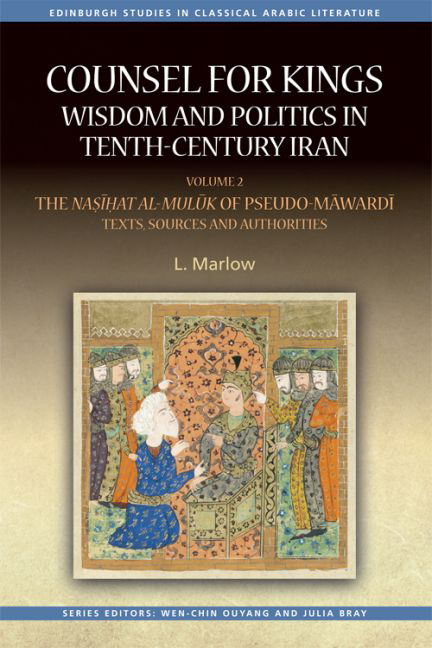 Counsel for Kings: Wisdom and Politics in Tenth-Century Iran
Counsel for Kings: Wisdom and Politics in Tenth-Century Iran Conclusion
Published online by Cambridge University Press: 07 October 2017
Summary
This book has concentrated on an early Arabic mirror for princes and its contexts. It has explored the mentality of the unidentified author, the intellectual, cultural and religious currents that shaped his perspective, and the circumstances in which he wrote, on the basis of the evidence furnished by the mirror itself and the parallels that it displays with the works of other, especially contemporary authors. The study has suggested a number of outcomes.
The dating and locating of Naṣīḥat al-mulūk's composition to tenth-century Balkh, already established by Aamad and An‚ārī, have been confirmed, and the evidence for them augmented. Naṣīḥat al-mulūk offers a regional as well as a theological–intellectual perspective, and supplements the fairly limited repertoire of materials currently available for the study of the Samanid domains during the earlier part of the tenth century. Aamad's suggestion of Abū Zayd al-Balkhī's authorship and An‚ārī's positing of the authorship of a student of Abū l-Qāsim al-Kaʿbī al-Balkhī are insightful in their linking of Pseudo-Māwardī with the circles of these two dominating figures in the intellectual life of early tenth-century Balkh. If the name of the author cannot, given the information currently available, be proven definitively (An‚ārī's proposal seems entirely plausible but is, for the time being, unverifiable), it is reasonable to conclude that Pseudo-Māwardī was a Balkhī, and that he shared the mentality of, and almost certainly knew, both of his illustrious fellow-citizens.
Pseudo-Māwardī was an engaged and thoughtful observer of kingship, and incidentally of countless other topics, but rather than being attached to the court or resident in the capital, he wrote from the remove of a major regional city. He wrote, furthermore, in response to a moment of seemingly widespread discontent on the part of various constituencies among the population. This sense manifested itself in pronounced disaffection and frequent rebellions, whether political or religious in appearance (in Pseudo-Māwardī's terms, whether directed towards riyāsa or diyāna). Both the frequency and in several cases the gravity of these eruptions may indicate not only the aspirations and ambitions of their leaders, but also the active or passive support of considerable numbers of ordinary people.
- Type
- Chapter
- Information
- Counsel for Kings: Wisdom and Politics in Tenth-Century IranThe Nasihat al-muluk of Pseudo-Mawardi: Texts, Sources and Authorities, pp. 246 - 252Publisher: Edinburgh University PressPrint publication year: 2016


